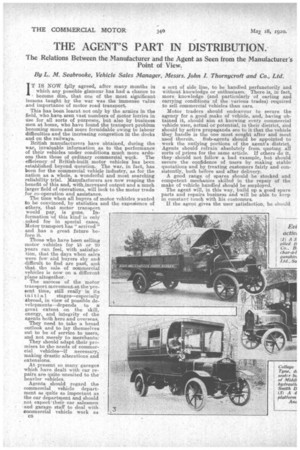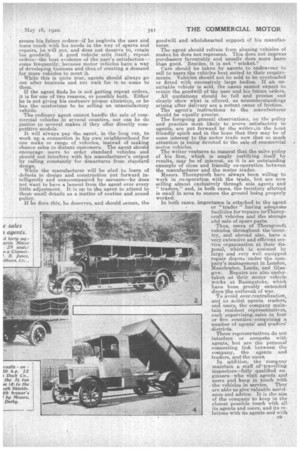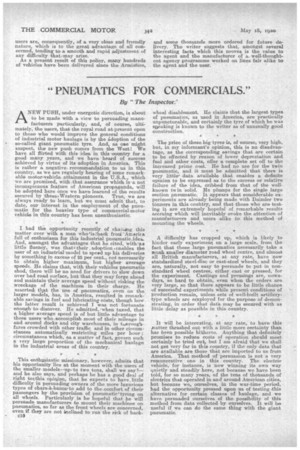THE AGENT'S PART IN DISTRIBUTION..
Page 8

Page 9

Page 10

If you've noticed an error in this article please click here to report it so we can fix it.
The Relations Between the Manufacturer and the Agent as Seen from the Manufacturer's Point of View.
By L. M. Seabrooke, Vehicle Sales Manager, Messrs. John I. Thornycroft and Co., Ltd.
IT IS NOW hilly agreed, after many months in which any possible glamour has had a chance to , become dim, that one of the most significant lessons taught by the war was the immense value .and importance of motor road transport.
This has been learnt not only by the armies in the field, who have seen vast numbers of motor lorries in Use for all sorts of purposes but also by business men. at home, who have found the transport problem becoming more and more formidable owing to labour difficulties and the increasing congestion in the docks and on the railways. British manufacturers have obtained, during the war, invaluable information as to the performance of their vehicles under conditions much more arduous than those of ordinary commercial vyark. The . efficiency of British-built motor vehicles has been established beyond question. The war, in fact, has been for the commercial vehicle industry, as for the nation as a, whole, a wonderful and most searching reliability trial. Manufacturers are now reaping the • benefit of this and, with,increased output and a much larger field of operations, will look to the motor trade for co-operation and assistance. The time when all buyers of motor vehicles wanted to be convinced, by statistics and the exparience of ethers, that motor transport wouldpay, is gone. Information of this kind' is only asked for in special cases. Motor transport has " arrived " and has a great future before it.
Those who have been selling motor vehicles for 15 or 20 years can feel, with satisfaction, that the days when sales were few and buyers shy and difficult to find are past, and that the sale of commercial vehicles is now on a different plane altogether.
The success of the motor transport movement, at the present time, still really in its initial stages—especially abroad, in view of possible developments—depends to a great extent on the skill, energy, and integrity of the agents both here and overseas.
They need to take a. broad outlook and to lay themselves out to be of service to users, and not merely to merchants: They should adapt their premises to the needs of commercial vehicles—if necessary, ma.king drastic alterations and extensions.
At present so many garages which have dealt with car repairs are quite unsuited to the heavier vehicles.
Agents should regard the commercial vehicle department as quite as important as the ear departnaent and should not expect their car salesmen .and garage staff to deal with commercial vehicle work as a; sort of side line, to be handled perfunctorily and without knowledge or enthusiasm. There is,. in fact, more knowledge (and particularly of carting and carrying conditions of the various trades) required to sell commercial vehicles than cars.
Motor traders should endeavour to secure the agency for a good make of vehicle, and, having obtained it, should aim at knowing every commercial vehicle user, actual or potential, in their district, and should by active propaganda see to it that the vehicle they handle is the one most sought after and most used therein. Sub-agents should be appointed to work the outlying portions of the agent's district. Agents should, refrain absolutely from quoting all sorts of _prices for the same article. If others do it, they should not follow a bad example, but should secure the confidence of users by making stable. quotations and by treating customers fairly and consistently, both before and after delivery.
A good range of spares should be stocked and competent mechanics skilled in the repair of the make of vehicle handled should be employed. The agent will, in this way, build up a good spare parts and repairs business and will be able to keep in constant' touch with his customers.
If the agent gives the user satisfaction, he should secure his future orders—if he neglects the user and loses touch with his needs in the way of spares and repairs, he will not, and does not deserve to, retain his goodwill. IA good vehicle sells itself ; repeat orders—the best evidence of the user's satisfaction— come frequently, because motor vehicles have a way of developing business and thus of creating a demand for more vehicles to meet it.
While this is quite true, agents should always go out after business and not wait for it to coma to them.
If the agent finds he is not getting repeat orders, it is for one of two reasons, or possibly both. Either he is not giving his customer proper attention, or he has the misfortune to be selling an unsatisfactory vehicle.
The ordinary agent cannot handle the sale of commercial vehicles in several counties, nor can he do justice to several makes if they offer directly competitive models. It will always pay the, agent, in the long run, to work up a connection in. his own neighbourhood for one make or range of vehicles, instead of making chance sales to distant customers. The agent should encourage users to order standard vehicles and should not interfere with his manufacturer's output by calling constantly for departures from standard design. While the manufacturer will be glad to learn of defects in design and construction put forward intelligently and unaccompanied by sarcasm—he does not want to have a lament from the agent over every little adjustment. It is up to the agent to attend to these small details as a matter of routine and sound policy.
If he does this, he deserves, and should secure, the goodwill and wholehearted support of his manufacturer.
The agent should refrain from abusing vehicles of makes he does not represent. This does not impress purchasers favourably and usually does more harm than good. –Besides, it is not " cricket."
Care should •be taken by agents to endeavour to sell to users the vehicles best suited to their requirements. Vehicles should not be sold to be overloaded or fitted with excessively large bodies. If an unsuitable vehicle is sold, the agent cannot expect to retain the goodwill of the user and his future orders.
All quotations. should be full and precise and clearly show what is offered, as misunderstandings arising after delivery are a potent cause of friction.
The agent's instructions to the manufacturer should be equally precise. The foregoing general observations, on the policy and practice most likely to prove satisfactory to agents, are put forward by the writerein the most friendly spirit and in the hope that they may he of some interest to the motor trade now that so much attention is being devoted to the sale of commercial motor vehicles.
The writer ventures to suggest that the sales policy of his firm, which is amply justifying itself by results, may be of interest, as it is an. outstanding example of close and friendly co-operation between the manufacturer and the motor trader.
Messrs. Thornyeroft have always been willing to work in co-operation with the trade, but are now selling almost exclusively through sole agents and "traders," and, in both cases, the territory allotted is small in area to ensure the ground being properly worked.
In both cases, importance is attached to the agent or "trader" ha,ving adequate facilities for 'repairs tceThonaycroft vehicles and the, storage and saleof spare parts.
Thus, users of Thornycroft vehicles throughout theleountry, and abroad also, have a very extensive and efficient service organization at their disposal, which is assisted by large and very well equipped repair depotseunder the com .; pany's management in London, Manchester, Leeds, and Glasgow. Repairs are also undertaken at their motor vehicle works at Basingstoke, which have been greatly extended since the outbreak of war.
To avoid over-centralization, and to aelkst, agents, traders, and users., the company maintain resident representatives, each' supervising, sales -in four or five counties: comprising a number of agents' and traders' districts.
These represertatives do not interfere or compete with agents, but are the personal connecting link between the company, the agents and traders, and the users.
In addition, the 'company maintain a staff ofqravelling inspectors—fully qualified engineers—who visit agents and users and keep in touch with the vehicles in service. They are able to give valuable assistance and advice. It is the aim of the company to keep in the closest possible touch with all its agents and, users, and its relations with its agents and with users are, consequently, of a very close and friendly nature, which is to the great advantage of all concerned, tending to a smooth and rapid adjustment of any difficulty that, may arise.
As a present result of this policy, many hundreds of vehicles have been delivered since the Armistice,
and some thousands more ordered for future delivery. The writer suggests that, amongst several interesting facts which this Droves is the value to the agent and the manufacturer of a well-thoughtout agency programme worked on lines fair alike to the agent and the user.




























